- Home
- M G Vassanji
Nostalgia Page 6
Nostalgia Read online
Page 6
It’s impossible to point out unsafe areas to youth and not expect them to head precisely there. We were aware even before we arrived—some of us had been told—that there were other, differently disposed people besides our smiling and always polite locals who were all employees, and there were other, not so pleasant areas that our risk-free safaris carefully skirted.
Accordingly one hot morning when it seemed we were not watched we ventured out along the beach in precisely the direction deemed unsafe by the management. A large black and white warning sign on the way confirmed our resolve; the skull and bones painted on it only increased our thrill. We had learned from a member of the staff that straight ahead was a settlement. Nothing seemed amiss at first, the tide was receding and the beach squelchy, the verge to our left was a glorious light green as though painted; we proceeded as a troupe of young people would, a few people collected shells, others got up to roughhousing, a boy and girl argued. Suddenly a monstrous sight appeared, so violently at odds with the rest of the scene that we simply stopped and stared. It was a mountain of metal—rusting car frames and ancient electronics and cables. It began some hundred yards from the beach and went perhaps a quarter of a mile inland—how did such a prodigious volume of stuff end up here? It had rendered all of us silent and shameful of our recent childishness. As we walked on, our enthusiasm and defiance now reined in, a smell of rot came riding on the vigorous breeze, and soon enough we came upon a refuse dump, a crater full of building debris and junk, topped by recent garbage, unbearably ugly and filthy. We were drawn on as though by some invisible force—we dared not become cowards now and turn tail—until finally we came upon the end of an unpaved village street where the dwellings were as in the myriads of images we’d seen, of mud or unpainted crude bricks. People seemed to be up to nothing but hanging about, a number of them young men with buff bodies. We got stared at a lot and didn’t feel safe. Putting on brave faces and speaking in boisterous tones to match, we stopped at a shack to have soft drinks. This was hardly advisable, considering the many warnings we had received, but seemed the right thing to do. A few little boys came around and stared longingly at us as we gulped our drinks, and so we had them join us; more came over and soon the shop ran out.
I remember feeling very low afterwards back at the hotel. The tour doctor gave me some mood lifters, and after a night of partying I had recovered.
I was young and idealistic then, and back home I genuinely despaired: how could we be blind to such disparities in our world? How could we shut them off? We needed a change in the world order. A revolutionary change. One day these wretched of the earth will rise and demand to be counted. They’ll make war on us. Like those living dead from the horror films who get up from their graves and start walking, killing and mutilating every human in sight. It takes time to grow up to realize that all the world’s problems will never be solved, poverty and violence will never be eradicated; hence we need the Border to protect ourselves.
That bizarre experience behind the Border is a thing of the past, a memory of a youthful adventure. A fictional memory nevertheless; and yet it’s so clear and complete in my mind that I’m convinced it’s also real, something that I brought with me. Now I let the likes of Holly Chu take me there, walk me through all the varieties of human degradation. There she was again on the show on the background roll, chattering away as she walked cheerfully up a street in Maskinia, wearing her signature tropical suit with many pockets and the safari boots and hat, panning on a desperate-looking woman with child here, a quick look at a doped gang member with a weapon there, then showing her cheerful face to the camera…as she’s done before, until this time she came to the dark doorway with only a pair of white eyeballs visible and the shadow of a figure. She turned sideways to look at us—and suddenly she disappeared and there came a short scream.
—
On her Profile she looked young and earnest, less glamorous, devoid of her media persona even when she was pictured as a journalist. The eyes wide and challenging, the hair always short but straight and black. The university photos showed a mere girl, of course, in all kinds of fun situations, including her birthday party and a holiday trip to a beach. The graduation photo with her family: on one side her father with neatly parted hair; on the other her mother, more glamorous with loose hair and a fitting Oriental-style green dress—the musician. On either side the precocious siblings, on the point of breaking away from the pose.
Messages expressing sympathy, sorrow, rage had continued to pile up on the Profile. A few hateful ones—you can’t avoid those in any circumstance. My heart skipped a beat when I saw this one:
Thanks, Holly, for taking me to places I would never go to! Keep up the spirit, we’ll get you out of there!—Pres.
Slowly I wrote,
—Pres, fancy meeting you here—how are you? How about a meeting?—FS.
How did I know for certain that it was Presley who wrote the message and not some Preston or Prescott? I didn’t. And to hell with Dauda and DIS if they were watching. And to hell with Tom, too.
TEN
The Notebook
#45
The Journalist
Holly sat on a wooden bench at the far end of the room, her eyes now adjusted to the shade. Outside the wide doorway, the world was bathed in blinding sunlight. The world from which she had been snatched. People drifting by, the sound of chatter, a shout, a vehicle. Shifting her gaze inside, fascinated, she watched her backpack being ransacked by the two women who had captured her, a pair of hands digging and scraping inside, randomly pulling out something, then the pack quickly exchanging hands. A tampon flung away towards a corner, fought for by the children, who mistook it for a thing to eat or play with. She half raised a hand, opened her mouth to protest, then stopped. It didn’t matter. A pack of condoms came out, the women smirked. A cotton pantie she’d already worn, recyclable. She’d thought she would find a suitable place to dump it. A force of habit, even when there was so much garbage littered about and stinking in the streets. The women held it to their waists, each in turn, the big one and the tall younger one, then put it aside along with the fresh one, for future use. Comb, toothbrush, toothpaste came out; jeans, shirt; medicines. A packet of biscuits, a couple of which were pulled out and nibbled by the women, the remaining lobbed carelessly in the direction of the grateful children; two packets of gum, a chocolate bar, an apple, and a can of sardines; batteries, penknife, spoon. She watched them put away some of her things, then stuff everything else into the backpack and shove it aside.
She was hungry and uncomfortable and faintly stinking, having wet herself in that terrifying moment when two pairs of hands sprang out from the dark hole in the wall and grabbed her and pulled her in. Her sensible eyeglasses, all-purpose pocket knife, and phone were snatched from her first, and she saw them now lying not far from her on the bench, gleaming faintly. She dared not reach for them. She rubbed her arm where the younger woman had bitten her, not hard but tenderly, as though to feel her flesh. The teeth had grazed her skin, the tongue had licked the dirt off her skin. She knew the women of this neighbourhood, though not these two, and had bantered with the children, who had followed her around and took gum from her. They must all know her. What would they do to her? She did not fear the women; it was the militia who frightened her. Everything about them was menace. Their open stares, their rippling strength and cocked weapons, their swaggering. She had believed herself to be immune from them, a journalist from there, under one of the watchful eyes in the sky, who could be rescued if necessary. What an illusion that was.
Some men of the militia came over a little later and roughly questioned the two women, and after what seemed like a bout of bargaining took away the pack, phone, and knife and half the chocolate, which had been stowed away. One of the boys went with them. The men barely cast a glance at her. She was like a captive chicken or goat, awaiting slaughter in her dark corner.
—
#46
The Gentle Warrior
<
br /> And you, Presley, where will you hide, you who are theirs, though you don’t know it yet? Where will you go, you who have no family or friends? Surrender to them, their Frankenstein, let them stitch you up and render you harmless. Live. Live? Live as who?
I cannot imagine you, Presley.
I dare not imagine you, Presley.
Still, you’ve got under my skin…
Who were you, Presley, who’s that lurking under your skin?
—
Stepping out of the Sunflower Centre, having dismissed his consultant, suddenly he no longer felt certain of himself. Should he go back and say to the doc, I’ve changed my mind, Doc, I need help? He meant well, the doc, he wanted to help. It was cool and cloudy, a brisk wind blew. Dry fall leaves were scattered about on the pathway and the grass. A passenger plane roared overhead, flying quite low. He glanced upward, read the tail logo. Pan American, recognized, vaguely. He hesitated a step, then kept walking towards the street.
It’s midnight, and the lion is out stalking.
Damn it. But he smiled, and instantly began to hum a song, to resist the intrusion. This was one of the defences he had developed. The song was by Aboubakar Touré. Marhaba, marhaba, marhaba…, he sang. He pulled a bike off a rack and rode it to the transit station. The effort and concentration calmed him. At the station he parked and caught a transit to Miller Street; reaching there he walked to the Brewery Tower and announced himself at the security office. He proceeded to the lockers where he changed into his uniform and then walked out to take up his duties, relieving with an apology the guard who had been waiting for him at the check-in desk on the main floor.
A message on his phone startled him. He was to report immediately to a clinic called Abdo about an urgent personal matter. Would this have anything to do with his recurring thoughts? Who else besides the clinic knew about them?…He had had a faint notion as he left the centre that he was being watched. He had dismissed it as silly. Now he felt vulnerable. Sitting behind his high desk, watching through the monitor the multitudes passing to and fro, he himself felt exposed. Even the man he had relieved, he suspected, had looked at him askance. But why? What had he done? He looked up Abdo Clinic. He thought he should hide.
ELEVEN
—DR SINA, HAVE YOU HEARD again from Presley Smith?
The molten-voiced Dauda from DIS, sounding only half a tone lower than before.
—No, I haven’t. I’ve not heard from Presley…Why do you ask?
—Have you tried to get in touch with him, Doctor?
She was offensive, and persistent, like a bad smell. But she was on the right track, of course. I paused only a moment before unravelling my lie.
—No. He’s your baby, you said. I have other patients to take care of. Besides, he told me his problem was under control.
—That’s interesting. But do you know where he is, Dr Sina?
—Why? Is he missing?
That met with a blunt silence, and so after another pause I reiterated my denial, offering what was only a half-truth.
—No, I don’t know where he is—if he’s not at home or work.
—He’s not at work or at his residence, Doctor. His condition could have worsened, that’s why we are concerned. If he tries to get in touch, please call me. We want to cure his problem. It will not resolve by itself, as he apparently believes. I’m sure you know that. If you could kindly explain that to him. You have referred him to us.
You mean lie to him. And you assume I will speak with him before you do. You’ve lost him, and you know he doesn’t trust you.
The pattern on the screen went blank and Dauda was gone.
I had only one patient that day, but the work was long and arduous, involving our different specialties at the centre. We’d encountered memory rejection—the patient’s fiction, the implanted autobiography, was rejected by her brain, and that was not only embarrassing but possibly dangerous. The task at hand was to debug the fiction, find the contradictions in it, one or more. Sometimes they can be trivial, a chronological or factual error, for instance. Others take all one’s ingenuity to uncover, the information stored deep inside the mind, often in pieces across the brain. This case was one of the latter and the bugs were finally eliminated electromagnetically.
As I came out of the Sunflower and was walking home by the river, somewhat preoccupied by the case, Presley Smith pushed forward into my mind again. I asked myself, why not simply drop him: he was a DIS concern, they should deal with him. They wanted him. The risk of offending the Department is never worth the trouble. It always knows better, in the end inevitably it comes out ahead. The spit falls back on you, as the saying goes.
But I knew I could not drop Presley. There was a bond between us. More and more I had come to realize that our lives were intertwined, and possibly in ways I dared not even contemplate.
Could we be mistaken, could Presley keep those rogue thoughts under control, as he said? On the surface of it, why not. We all get nagged by random thoughts occasionally, which we live with until they disappear—that is, we’ve forgotten them. But who was I kidding? Presley’s outlying thoughts were genuine leaks, memories from another life—I knew that, DIS knew that, and he knew that. He had not denied his symptoms, simply refused treatment.
No probes. Was that sufficient reason?
He could have been a dangerous criminal in a previous life. A serial killer or a child-torturer or a terrorist who now posed the risk of waking up and therefore had to be…neutralized? He was their man, as Dauda said; they knew him. Why not trust them, the guardians of our safety? In keeping my interest in him, against their demand, I could well be abetting a potential criminal. I could be setting him loose on the public when he truly belonged in the prison of his altered mind.
If he were made to stay there, would I then be free of him?
—
Think pleasant thoughts, I counselled myself. Recall last evening, how Joanie and you spent it together, and you didn’t have to stoop to sniffing out telltale smells on her. She was all yours. All yours.
After a dinner of coconut fish (my concoction), as we sat in the living room over a crisp Shiraz, she said to me,
—Why are you so preoccupied of late?
Genuine concern. She came to stand next to me where I sat, fingers caressing my hair as I pressed my head against her warm belly. Tears came, I’m ashamed to say, I had become so incontinent lately and the wine didn’t help. I feigned surprise.
—Am I? It’s just a patient of mine I’m worried about. A tough case.
—I think you keep things from me.
A fine one to j’accuse. As I’ve said, it is the insouciance of this generation—or is it the utter innocence?—that takes you by surprise. No wonder we call them Babies. Surely she knew that her own cheating hurt me? But then how could she, when I was always ready with a fawning smile when she returned from a tryst, forgiving her spontaneously instead of confronting her?
—There’s the professional code of confidentiality, I told her.—I can’t discuss patients.
—I don’t mean that! Do you keep a diary?
—Not a diary diary…just notes…
—The problem with you oldies is that you have secrets from your long lives. I get lonely sometimes, you know.
She had sat down now and spoke with a sadness that seemed genuine, and I felt needed. Maybe, I thought. Maybe…there’s hope, that the generations will come closer. Age need not be a handicap, as sexual orientation or race or physical challenge once were. We don’t have lepers or wogs anymore. We live in more tolerant times with richer lives, and fulfillment comes in all shapes—
—Ouch!
My happy daydream as I walked home with a wry smile on my lips was rudely shattered as a virile young man on a monobike jostled past, hitting my shoulder with force. A pain shot up the joint. The attacker swung his head to stifle my startled expression with a toothy snarl, doubtless a resentful BabyGen who would have us GN folks collectively gassed or gunned down t
o make room for the likes of him. Even Joanie had expressed this feeling, though hardly with any loathing:
—Growing up is not half as good as it used to be, Frank, even fifty years ago. Admit it! You had it so good, you were pampered right into middle age like big babies. Then, on top of all that security, you built up your lives and fat worths. What chance do we stand in this world that you’ve made? What do we inherit when our natural parents simply move on, taking their wealth with them?
—
Joanie’s childhood is no fiction. That’s always a startling thought. There’s an actual house in Wynnewood, Pennsylvania, where she can knock on the door and tell the inhabitants, This is where I grew up, this is the room in the house extension where I slept. It’s a large bungalow in the circular end of a cul-de-sac, with a large front lawn, a long driveway, and a backyard where the children played on swings. There is a high-achievers’ school in the district that she attended in her teens, where she shot hoops with the future basketball star Toby Carter, and there’s a mall in a suburb called King of Prussia not far off where she hung out with her first boyfriend. Her father was a furniture designer and her mother sold houses, part-time. I never saw them, they had gone away when I met Joanie. Besides the sister who lives in our neighbourhood, she has a brother. After coming to Toronto and moving in with me, she returned only once to Wynnewood, to attend the funeral of her grandmother. It was then that we met her brother, Jeff, who took us for drinks to the bar he owned and managed. Our dining room table and chairs were designed by her father. She keeps an album of photos, and one day gave me an illustrated narrative of her life. This brought tears and laughter to her face—expressions of an uncommon intensity that would have been worth recording: those blinded eyes, the dimples on the cheeks, the embarrassed look, the stains on her face when she had wiped it with the back of her wrist. All that life is gone. Though she can touch it in some way, she sometimes misses it intensely.

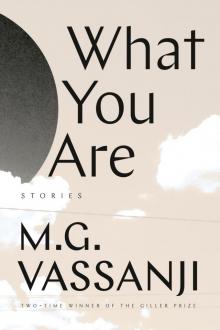 What You Are
What You Are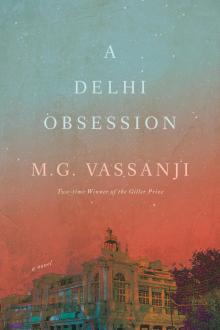 A Delhi Obsession
A Delhi Obsession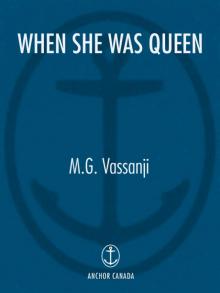 When She Was Queen
When She Was Queen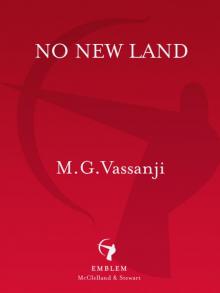 No New Land
No New Land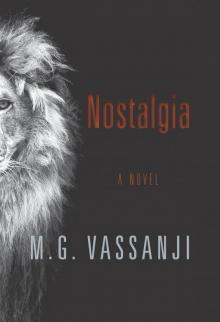 Nostalgia
Nostalgia Mordecai Richler
Mordecai Richler The Book of Secrets
The Book of Secrets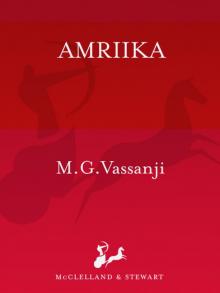 Amriika
Amriika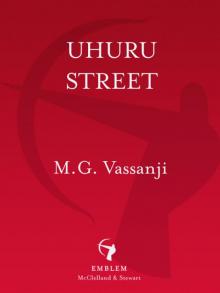 Uhuru Street
Uhuru Street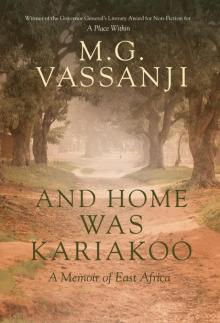 And Home Was Kariakoo
And Home Was Kariakoo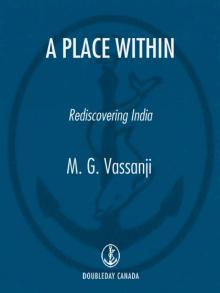 A Place Within
A Place Within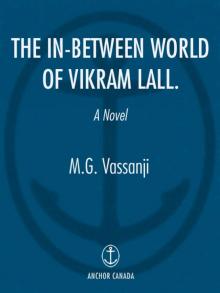 The In-Between World of Vikram Lall
The In-Between World of Vikram Lall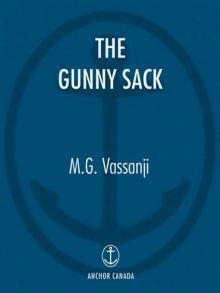 The Gunny Sack
The Gunny Sack